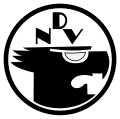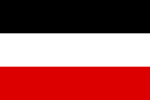حزب خلق ملی آلمان
حزب خلق ملی آلمان (به آلمانی: Deutschnationale Volkspartei، یا به اختصار DNVP) نام یک حزب محافظهکار ملی بود که در زمان جمهوری وایمار فعالیت داشت. تا پیش از برآمدن حزب ناسیونالسوسیالیست کارگران آلمان، حزب خلق ملی آلمان عمدهترین حزب محافظهکار و ملی آلمان بود. این حزب در اواخر ۱۹۱۸ میلادی و پس از انقلاب ۱۹۱۸-۱۹۱۹ آلمان پایهریزی شد.

این حزب مخالف سرسخت قانون اساسی وایمار و پیمان ورسای بود. از ۱۹۲۹ حزب با حزب نازی آدولف هیتلر وارد همکاری شد، در ۱۹۳۳ از صدارت عظمای هیتلر حمایت نمود و در همان سال منحل گردید.
جستارهای وابسته
ویرایشمنابع
ویرایش- ↑ Larry Eugene Jones, The German Right in the Weimar Republic: Studies in the History of German Conservatism, Nationalism, and Antisemitism, Berghahn Books, 2014, p. 80
- ↑ ۲٫۰ ۲٫۱ Winkler, Heinrich August (2000), Germany: The Long Road West, 1789–1933, Oxford University Press, p. 352
- ↑ R. Eatwell, Fascism: A History, London: Pimlico, 2003, p. 277
- ↑ Dudek, Peter; Jaschke, Hans-Gerd (1984). Entstehung und Entwicklung des Rechtsextremismus in der Bundesrepublik. Vol. 1. Westdeutscher Verlag. pp. 181–201.
- ↑ Robert Wistrich, Who's Who in Nazi Germany, Bonanza Books, 1984, p. 157
- ↑ Peter Davies, Derek Lynch. The Routledge Companion to Fascism and the Far Right London, England, UK; New York, New York, USA: Routledge. p.94.
- ↑ Seymour M. Lipset, "Social Stratification and 'Right-Wing Extremism'" British Journal of Sociology 10#4 (1959), pp. 346-382 on-line
- ↑ Ulrike Ehret (2012). "The Catholic right, political Catholicism and radicalism: the Catholic right in Germany". Church, Nation and Race: Catholics and Antisemitism in Germany and England, 1918-45. Manchester University Press. ISBN 978-1-84779-452-9.
- ↑ Kitchen, Martin (2006), Europe Between the Wars: A Political History (Second ed.), Pearson Education, p. 249
- ↑ Barth, Boris (2006), Genozid: Völkermord im 20. Jahrhundert: Geschichte, Theorien, Kontroversen (به آلمانی), C. H. Beck, p. 176
- ↑ Serge, Victor (2011), Witness to the German Revolution, Haymarket Books, p. 232
- ↑ Gunlicks, Arthur B. (2011), Comparing Liberal Democracies: The United States, United Kingdom, France, Germany, and the European Union, iUniverse, p. 127
- ↑ Ringer, Fritz K. (1990), The Decline of the German Mandarins: The German Academic Community, 1890–1933, University Press of New England, p. 201
- ↑ Eric D. Weitz, Weimar Germany: Promise and Tragedy. (Princeton: Princeton University, 2007), 95–96.
- ↑ Adolf Hitler: a biographical companion David Nicholls page 178 November 1, 2000 The main nationalist party the German National People's Party DNVP was divided between reactionary conservative monarchists, who wished to turn the clock back to the pre-1918 Kaisereich, and more radical volkisch and anti-semitic elements. It also inherited the support of old Pan-German League, whose nationalism rested on belief in the inherent superiority of the German people
- ↑ Kershaw, Ian "Ideology, Propaganda, and the Rise of the Nazi Party" pages 162-181 from The Nazi Machtergreifung edited by Peter Stachura, London: George Allen, 1983 page 165.
- ↑ Jones, Larry Eugene; Retallack, James (1992). Introduction. Elections, Mass Politics and Social Change in Modern Germany: New Perspectives. Cambridge University Press. p. 11.
- ↑ Stibbe, Matthew (2010). Germany, 1914–1933: Politics, Society and Culture. Pearson Education. p. 212.
- ↑ Caldwell, Peter C. (1997), Popular Sovereignty and the Crisis of German Constitutional Law: The Theory & Practice of Weimar Constitutionalism, Duke University Press, p. 74
- ↑ Caldwell, Peter C. (2008), "The Citizen and the Republic in Germany, 1918–1935", Citizenship and National Identity in Twentieth-Century Germany, Stanford University Press, p. 48
Wikipedia contributors, "German National People's Party," Wikipedia, The Free Encyclopedia, https://en.wiki.x.io/w/index.php?title=German_National_People%27s_Party&oldid=864135726 (accessed November 16, 2018).

